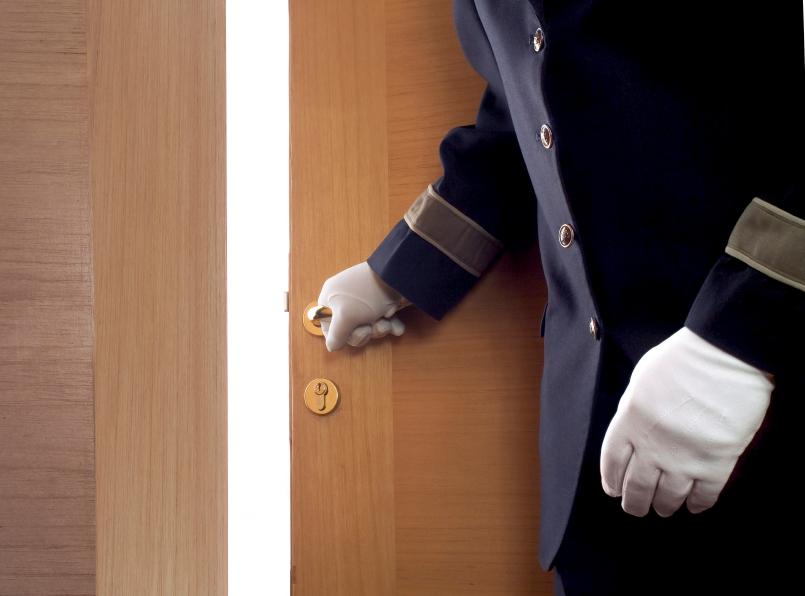Well-Trained Employees Make Risk Management a Team Effort

By Elizabeth Johnson, Senior Public Relations & Marketing Manager, American Hotel & Lodging Educational Institute
Guest safety and security are not the sole responsibility of a property’s security or risk management team. Every hotel employee plays a role in maintaining the security of the property and its guests. Therefore, training in basic security awareness and response is a necessary component of every employee’s orientation and continued training, no matter what department they work in. Security training issues to be covered include protecting guests’ information and assets, recognizing and reporting unsafe conditions, fire prevention, and anti-terrorism awareness. Training develops confident employees who perform their security duties as one aspect of the service they deliver to guests.
When guests visit a property, they expect a stay that is clean, comfortable—and safe. Even if they can’t quote the law, they know that a hotel has a duty to provide reasonable care for the safety and security of its guests. That includes having someone on staff who is responsible for security and risk management. But whether that person is a director of risk management, security director, or the general manager, he or she can’t single-handedly manage every possible security risk. That takes a team effort and a commitment by everyone on staff to be aware of potential risks and to do their part to keep guests safe. A big part of any risk manager’s job is training all employees to think about security as they perform their daily tasks.
Educate Employees about Reasonable Care
Clarence Izzard, senior risk control manager for Starwood Hotels & Resorts, stated that the basis for all employee security training is the concept of reasonable care.
“So much of security is common sense,” he said. “Reasonable care explains what we do and why we do it.” He noted that the scope of safety and security topics for which employees need a basic understanding includes everything from guest lock-outs, missing articles, and noise complaints to power failures, drug use and manufacture (meth labs), and the death of a guest, and numerous other minor and major concerns.
Hotel employees are the eyes and ears of a successful risk management program. They are the ones in the guestrooms and corridors, and they know when things are not quite right. Their role is to be alert of potential security problems and promptly report them to security. Something as simple as reporting a burned-out light bulb in a corridor may prevent an accident or a robbery.
“People often think about major issues when they think about guest safety and security, but it’s the little things that employees notice and report—a light out, a piece of torn carpet, a wet floor—that make a big difference,” said Daniel Danson, CLSD, senior director of global safety and security for the Americas, Marriott International. “A guest is much more likely to slip and fall in the lobby than they are to be confronted by an active shooter coming through the front door of the hotel.”
Training in fire safety and prevention is another way that hotels can safeguard the well-being of their guests. Employees should know where the property’s fire extinguishers are and how to use them. Izzard related the story of an employee at a Starwood property who discovered a small fire and had the presence of mind not to panic.
“He put in a call to security to have them call 911, then grabbed a fire extinguisher and put out the fire,” said Izzard. “It doesn’t seem like a major heroic action, but in my mind, it was, because the smallest fire can become a major emergency in no time at all.”
But while it’s important to train all staff members to extinguish or contain a small fire, it’s even more vital that employees are familiar with your property’s fire escape routes and can calmly and confidently assist with evacuating guests to safety.
Risk management training for employees should also include fire prevention awareness. Many of the leading causes of hotel fires—faulty wiring, lint build-up in dryers, improperly stored chemicals, and overloaded outlets—are things that employees can prevent. Department-specific training can teach employees to use safe procedures, as well as to recognize and report unsafe conditions or actions. The department head or training manager can work in conjunction with the security director to ensure that all important fire safety topics are covered.
Guest Service Touchpoints Offer Opportunities to Promote Security
Danson noted that safety and security issues are present at many touchpoints of guest-employee interaction. That’s why it’s important to include every employee in security training.
Front desk agents must protect the privacy of guests’ credit card information and room numbers, and follow security procedures related to the issuing---and reissuing of guest keys. Housekeepers need to be alert to keeping out unauthorized people seeking access to guest rooms and to recognizing and reporting unusual or suspicious items found in guest rooms.
All hotel employees—front desk agents, housekeepers, parking valets, and bell staff—can provide security as part of their guest relations duties. Without unduly alarming guests, employees can let guests know the steps they can take to keep themselves safe. Demonstrating door locks and key cards, pointing out emergency exits, informing guests about safety deposit boxes and in-room safes, and distributing traveler safety tip cards can make guests more aware of their own security.
Security Training Builds Employee Confidence
In today’s post-9/11 environment, hotel security training for employees must also include a focus on recognizing, reporting, and responding to situations that could indicate possible terrorist activity. David Leonardis, former commandant of the New Jersey State Police Academy, has stated that the four terrorists who highjacked Flight 93 from the Newark International Airport on September 11, 2001, left many clues to their activities in the guestrooms of the airport hotel where they stayed from September 7-9. Leonardis’ recruits, who assisted the FBI and crime scene investigators, found flight manuals, phony IDs, diagrams of the airplane and the airport terminals, and false wigs and beards in the hotel’s trash bins. All of these items had been seen and discarded by the property’s housekeepers. Had they known what to look for and what those items might mean, they could have reported those suspicious clues to authorities and perhaps averted a disaster. The current climate underscores the need to empower hotel front-line staff to be vigilant and vocal—to be on the watch and to sound the alarm when things are not as they should be. Employees need to know how to answer these common questions:
• What do I look for? • How do I know it’s suspicious? • Should I report it?
The simple message of all anti-terrorism training is this: If you see or hear something suspicious—report it, or as the national Department of Homeland Security (DHS) campaign states, “If you see something, say something.”
Danson commented that Marriott’s employee security training includes both DHS training and brand-specific training covering employees’ security responsibilities. The training is part of employee orientation and refresher training is offered throughout the year.
Danson stated that a strong training program helps employees feel more prepared for their daily work, as well as for the relatively rare occurrences that may happen, such as an active shooter situation.
“Ultimately, they feel more confident because of the knowledge they gain in training. And, they appreciate that we are giving them the tools to keep themselves and their guests safe,” said Danson.
Izzard noted that occasionally, employees may feel intimidated at the thought that they have security responsibilities. They are worried that they might not remember what to do.
“But it’s really very simple,” he explained. “The important thing is to get to the right people—the manager or security director—and pass on the information. Others can take it from there.”
Good Security is Part of Guest Service
Izzard added that one of the most effective things employees can do to keep their property safe is to smile and speak pleasantly to every person they see. People who belong at the property will appreciate the expression of welcoming hospitality. Those who don’t belong, and who don’t want to be noticed, will be taken aback by the attention, and may even decide to leave the premises rather than risk being asked their business.
“Good security is not the enemy of good guest service,” said Izzard. “In fact, it is an important part of guest service—guests want to feel safe.”
Hopefully, guests will never need to know how well prepared a property is to protect them from security and safety threats. But it’s vital that all of the systems and procedures are in place just the same. Making sure that every employee is trained to be part of a hotel’s risk management team will go a long way toward ensuring that guests will have the safe and secure experience they expect.
Elizabeth M. Johnson is senior public relations & marketing manager for the American Hotel & Lodging Educational Institute (EI). She has worked for the Educational Institute for 15 years in a variety of communications, public relations, and marketing roles. During that time, she has written numerous articles about hospitality training, education, and professional certification for several hospitality trade publications. Ms. Johnson is the co-author (with Bridgette Redman) of two Educational Institute textbooks Spa: A Comprehensive Introduction and Retail Management for Spas, and contributed to the development of the Supervisory Skill Builders for the Spa Industry workbook series. Ms. Johnson was also a contributing writer for the Educational Institute’s case study series. Ms. Johnson can be contacted at 517-318-2359 or EJohnson@ahla.com
Republished from the Hotel Business Review with permission from www.HotelExecutive.com






